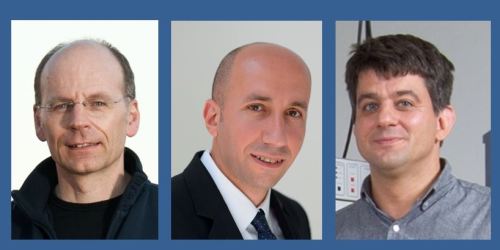Monash University awards three HZB-scientist with adjunct professorships

Prof. Klaus Lips, Prof. Emad Aziz and Dr. Alexander Schnegg (f.l.t.r) have been awarded with adjunct professorships by Monash-University. © HZB
Cooperation between Helmholtz-Zentrum Berlin (HZB) and Monash University, Melbourne, Australia, is thriving. Now, Monash University has awarded three HZB-scientists with adjunct professorships: Prof. Klaus Lips, Dr. Alexander Schnegg and Prof. Emad Aziz have been working several years already with Prof. Leone Spiccia, an internationally renowned chemist at Monash University, on energy materials science.
Spiccia is investigating artificial photosynthesis in order to develop solutions to convert solar energy into easily storable hydrogen. In 2011 and 2014 he spend time as a guest scientist at HZB working with teams of Lips, Schnegg and Aziz. Numerous publications in high impact journals have been the result of this fruitful collaboration.
As adjunct professors the HZB-scientists are entitled to organise workshops and seminars at Monash University and to further common research projects. To do so, they are given access to the resources of ARC Centre of Excellence for Electromaterials Science at Monash University.
.
arö
https://www.helmholtz-berlin.de/pubbin/news_seite?nid=14480;sprache=en
- Copy link
-
New Helmholtz Young Investigator Group at HZB on perovskite solar cells
Silvia Mariotti is returning to HZB as head of the new Helmholtz Young Investigator Group ‘Perovskite-based multi-junction solar cells’. The perovskite expert, who was previously based at Okinawa University in Japan, aims to advance the development of multi-junction solar cells made from different perovskite layers.
-
Hydrogen storage in MXene: It all depends on diffusion processes
Two-dimensional (2D) materials such as MXene are of great interest for hydrogen storage. An expert from HZB has investigated the diffusion of hydrogen in MXene using density functional theory. This modelling provides valuable insights into the key diffusion mechanisms and hydrogen's interaction with Ti₃C₂ MXene, offering a solid foundation for further experimental research.
-
HZB and National University Kyiv-Mohyla Academy start cooperation in Energy and Climate
Helmholtz-Zentrum Berlin für Materialien und Energie GmbH (HZB) and the National University of "Kyiv-Mohyla Academy" (NaUKMA) have signed a Memorandum of Understanding (MoU). The MoU serves as the starting point for collaborative research, academic exchange, and capacity-building between the two institutions. Actions will be taken to establish the Joint Research and Policy Laboratory at NaUKMA in Kyiv. The aim of the future laboratory is to jointly develop research and policy analysis, focusing on the energy and climate dimensions of Ukraine’s EU integration.
